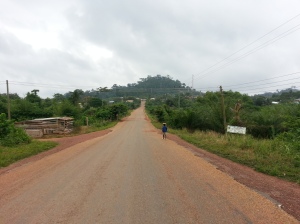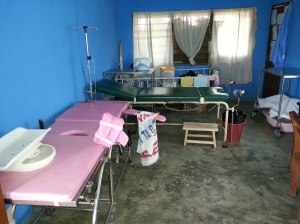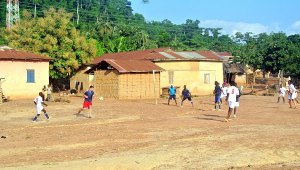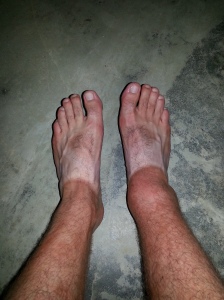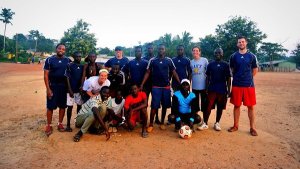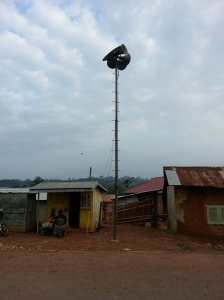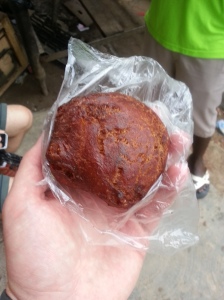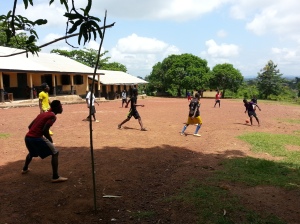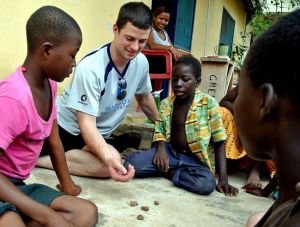Note: I’ll be blogging about my time in Ghana over the course of the next few weeks. Some entries will cover the course of multiple days while some will cover the course of only a day.
Ghana trip – Days 13-15
Day 13 (6/25/13) – Day of Preparation
There was no PA system blaring the morning of June 25, so I had my best night of sleep thus far. Even the sheep, goats, roosters and other noises seemed minimal in the morning for whatever reason. As soon as I woke up and began writing, I became conscious of the fact that exactly one week from June 25 I’d be back in Wisconsin. I knew I’d miss the people and place of Humjibre but I was looking forward to returning home to share my experiences and I was also looking forward to moving to Boston.
Since I’d be traveling for a few days before leaving Ghana completely, I was also aware that I only had four days left in Humjibre. Now that the books had been delivered to Sorano, everything seemed to be gearing up towards the Quiz Competition that was taking place on the upcoming Friday.
Because I had put in a considerable amount of time reading and formulating questions for the QC, my workload was pretty light. Therefore, I was able to take advantage of some cool opportunities that aren’t always available to GHEI volunteers. One of these opportunities was to observe teaching in Humjibre, which I wrote about in a previous entry. Another of these opportunities was to tour the clinic in Humjibre, which I’d be doing with Shantie and John on this day.
Before going to the clinic, John and I had a conversation about health and education and how they intertwine. I mentioned the fact that some doctors have to give toddlers books to see how they react. Do they throw the book aside and treat it as a toy? Or, do they handle it with care and open the front cover as they may have been taught by a parent? These are indicators that a child is exposed to books before they are school-age children.
This made me think of many things. One, is it the doctor’s responsibility to promote literacy in children before the age of 4-5 years old? If it’s not, whose is it? I know the clear answer is parents but let’s be realistic, not every parent encourages their child to read. Also, will a child’s literacy affect a person’s insurance rate? Will that person pay a higher premium if they can’t demonstrate how to handle a book, identify a cover/author/title/where to begin reading, etc.? I’m willing to bet that if someone can prove that illiteracy to leads to x, y and z (similar to how smoking leads to a different x, y and z), then at some point it will affect insurance.
When we made it to the Humjibre clinic, there was six staff present. One of the nurses lives there, so 24 hour care is available. It is a very small clinic, there is one maternity ward (contains 2-3 beds), one male ward (4-5 beds) and one female ward (4-5 beds). No beds were occupied when we were given the tour. The clinic sees anywhere from 10-30 people per day.
Since the clinic was so small, the paragraph above pretty much provides the extent of what we saw. The other time we spent there was chatting and joking around with the nurses, who were (unsurprisingly) extremely nice and welcoming. Some were more jovial than others, and it was fun to joke around a bit.
Following our time at the clinic, Lawrence, John and I set off to formally invite each school to the Quiz Competition. We also wanted to get a list of participants so we could verify that students were from the particular “grade” that was listed on the sheet. This didn’t really happen, so a different firm deadline was set by Lawrence. Apparently, many people try to cheat in order to gain a competitive advantage (imagine that).
I also had my second, and final, Twi lesson, in which I learned months, some food, body parts and numbers. Following my Twi lesson, John and I went up to play some football (soccer) to get some extra practice in anticipation of our match tomorrow. Soon enough, we attracted some boys who wanted to play.
We set up a common game that the children play in which two large stones (roughly the size of a cinder block) are placed at opposite ends to act as goals. When space and/or players are limited, this is the form of football that is played. The object is the same, to score goals. Our game started as a 3-on-3 game but eventually grew to 6-on-6. As more players were added we simply put more space in between the stones to give us a bigger playing field.
The ages of the boys playing ranged probably from 8-14 years old. John and I were on the same team and we actually won 8-2. In fact, I scored on a pass from John and John scored on a pass from me. I could skip mentioning the fact that I missed close to 10 wide open shots on the goal but I figure I’ll go for full disclosure here. The game was a lot of fun and it was another good test for my ankle. I felt really limited, as I couldn’t cut or run with ease, confidence or painlessness. This was one of the most discouraging things of my trip: I really wished I was healthy to play without reservation. However, I didn’t let my ankle hold me back from playing, from walking all over town, from farming, and from doing other activities.
I was looking forward to our highly anticipated football match that was to take place the next day. We were going to be playing on Humjibre’s main pitch and there was even going to be an announcement on the PA system. I had two goals: the first was to not fall down (so I could avoid gravel, razors, rocks, etc.) and the second was to score a goal, as I was positioned as the striker. This goes without saying, but I also wanted to win the game.
At night, I observed a very clear sky and saw the brightest stars I had ever seen. If I had known what constellations to look for I bet I could have found them all. It was a really pretty sight.
Day 14 (6/26/13)
The morning of Day 14 was similar to many other mornings. I walked to town to get some bowl fruit and then I came back, had some coffee with the bowl fruit and started reading. I was really getting hooked on The Joys of Motherhood and wrote down a quote from the book that I think is true:
“Yes, life could be at times so brutal that the only things that made it livable were dreams.”
Following breakfast we had an education team meeting where we discussed the Quiz Competition. All of the questions at that point were finalized and I then created a scoring sheet that would be used. We then met with the GHEI staff to brainstorm ways to attract volunteers to GHEI. I mentioned that we should work to attract other teachers because not only did I (hopefully) do a service for GHEI and Humjibre but the education I gained from my experience is something I took home with me and it’s also something I will use in my teaching to help my students. I truly believe that the education “expertise” I brought to GHEI pales in comparison to the education I received just by being there.
In the afternoon we played our football match and won 2-1. We played a team from Humjibre of people who were probably 18-22 years old. The game attracted probably close to 50 people, if not a little more. It was truly a blast playing. Probably because of my ineptitude for scoring, Coach Alfred put me in as a defenseman, which I appreciated. This resulted in much less running around on my ankle and just less running overall. I thought I did pretty well, as their only goal came on a penalty kick. Our keeper, Mensah, had some pretty incredible saves, too.
Our team was clearly anchored by the Ghanaians on our team who work and volunteer for GHEI. Afterwards, we went to Sister Comfort’s for our victory drinks. Everything tastes better after a win. Also, I had to shift my goals since I no longer had much of an opportunity to score a goal. I focused on not falling down and winning and I’m glad to report that I/we achieved both goals.
At night, because JHS students had finished up with a week of standardized tests (for SHS placement) the week prior, there was a dance party in the community center, which is located about 30 yards away from where I slept. The music was blaring and was so loud that our windows and walls were rattling. This made sleep impossible so I went outside to play with some children.
In fact, this decision to go outside and play was one that resulted in something truly impactful, which I’ll save for a later blog entry. The music ended at about 1am and I was able to fall asleep around then. I then woke up at 6:30 to begin my second to last day in Humjibre.
Day 15 (6/27/13)
When I woke up I started doing my laundry almost right away in hopes that it would dry in the morning in case of rain. Although there was some sort of weird satisfaction in hand washing, I knew I’d appreciate a washer and dryer more when I got home.
On my way to get my morning bowl fruit, I was pulled aside by a middle aged gentleman who was seemed drunk. It was about 7:30 in the morning. I used my limited knowledge of Twi to ask him his name and to ask him how he was. Quite frankly, he told me he was not happy because he was so poor. This was pretty surprising to me because it was the first person I had met who was openly unhappy about being impoverished.
Since I had been buying bowl fruit on a near daily basis, the lady who made and sold the food and I had developed a bit of a rapport. We began conversing in Twi first but I became lost after about two exchanges. We then switched to English but she struggled a bit with the language. However, she did say she wanted me to learn her language so we could talk more. I told her I was leaving in two days and she didn’t seem pleased. She asked me if I would take some bowl fruit with me to the U.S. and I told her I would (but I didn’t…because I ended up eating it).
The majority of the morning and afternoon was spent preparing for the Quiz Competition. We wrapped dictionaries and pencils that were prizes to be given to each participant. I also created a document of teaching ideas and literacy strategies that had worked for me in the past. I put the document on the GHEI education computer. Hopefully the team can look it over and see if anything is of use. I made sure to let them know that they can throw it away if they want. My intention wasn’t to tell them what to do, rather, it was to give them some ideas of things that have worked for me.
In the afternoon, I went to a funeral with some GHEI staff. Funerals are a pretty big deal in Ghana, as there is a get together the day after death, one week after death, and two weeks after death. GHEI usually sends a person (or people) to every funeral to offer support to the community. I think this is a really nice gesture and probably one that the community appreciates.
We were at the funeral for about 45 minutes and it wasn’t like a traditional U.S. funeral. When we arrived, people were seated in a square while there was a chair with the deceased person’s picture on it. Music was playing and people were making donations to the family. Unlike the Catholic mass, donations were publicized, so there was some sort of pressure to give a decent amount. We shook hands around the square and then took our seats while other arrivals went around the square and shook hands. GHEI did donate money to the family.
After the funeral, we began setting up the community center for the Quiz Competition. The big day was finally only hours away and everyone was getting excited. The following day was also going to be my last day and night in Humjibre, which was saddening yet exciting. I was looking forward to traveling with Happy and John but I knew that I was really going to miss Humjibre.

